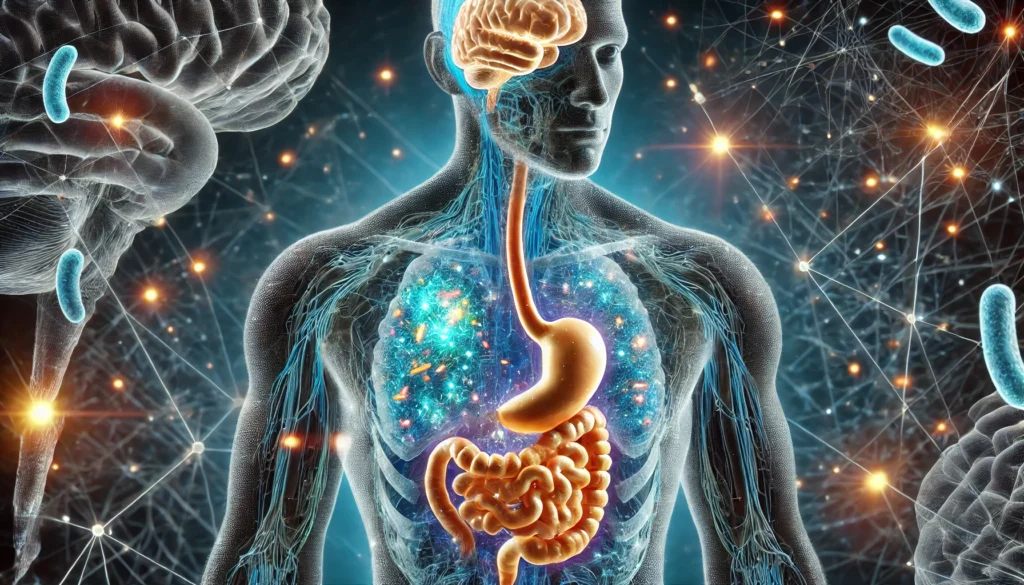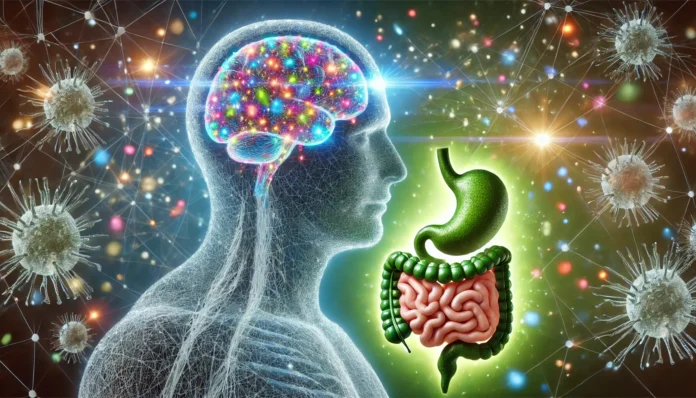Understanding the Gut-Brain Connection
The relationship between gut health and mental well-being is a complex and evolving area of research. The gut-brain axis, a bidirectional communication system linking the gastrointestinal tract with the central nervous system, plays a crucial role in regulating mood, cognition, and overall mental health. The gut microbiota, a diverse community of bacteria residing in the intestine, influences this connection through multiple pathways, including the production of neurotransmitters, modulation of inflammation, and interaction with the immune system. When imbalances in the gut microbiome occur, they can contribute to neurological and psychiatric conditions, underscoring the need for effective gut microbiome disease treatment.
You may also like: How to Improve Gut Health Naturally: Science-Backed Tips for a Stronger Microbiome
Scientific studies have demonstrated that disturbances in the gut microbiota, often referred to as dysbiosis, are associated with disorders such as depression, anxiety, and even neurodegenerative diseases like Alzheimer’s and Parkinson’s. The mechanisms behind this connection include altered microbial diversity, excessive inflammation, and reduced production of beneficial metabolites such as short-chain fatty acids (SCFAs). As a result, the focus on gut microbiome disease treatment is gaining traction as a potential therapeutic strategy for enhancing mental health outcomes.
The Role of Major Gut Microbiota in Intestine Treatment and Recovery
Several major bacterial species play a critical role in maintaining intestinal and cognitive health. These include Bacteroides, Firmicutes, Lactobacillus, and Bifidobacterium, which are essential for breaking down dietary fiber, producing SCFAs, and modulating immune responses. The balance among these microbial populations is delicate, and any disruption can lead to digestive disorders, increased systemic inflammation, and altered neurotransmitter production.
To promote gut microbiota recovery, interventions such as probiotic and prebiotic supplementation, dietary modifications, and fecal microbiota transplantation (FMT) are being explored. Probiotics, live beneficial bacteria, help repopulate the gut with health-promoting strains, while prebiotics provide the necessary nutrients to support their growth. Clinical evidence suggests that these interventions can improve symptoms of irritable bowel syndrome (IBS), inflammatory bowel disease (IBD), and even psychiatric conditions such as anxiety and depression.
FMT, an emerging therapeutic approach, involves transplanting fecal matter from a healthy donor into a patient with dysbiosis. This method has shown promise in treating recurrent Clostridium difficile infections and is being investigated for its potential in neurological disorders. As research progresses, the importance of targeting major gut microbiota in intestine treatment and recovery becomes increasingly evident for both physical and mental health.
How Gut Microbiome Disease Treatment Improves Mental Health Outcomes
The impact of gut microbiome disease treatment on mental health is profound. By restoring microbial balance, these treatments can regulate inflammation, enhance neurotransmitter production, and stabilize the hypothalamic-pituitary-adrenal (HPA) axis, which governs stress responses. Chronic inflammation, often exacerbated by dysbiosis, is a known contributor to mental health disorders. Strategies that reduce gut inflammation, such as dietary interventions rich in fiber and fermented foods, have demonstrated efficacy in improving mood and cognitive function.
Neurotransmitter production is another critical aspect of the gut-brain connection. Many neurotransmitters, including serotonin, dopamine, and gamma-aminobutyric acid (GABA), are synthesized or influenced by gut bacteria. Approximately 90% of serotonin, a key mood-regulating neurotransmitter, is produced in the gut. Enhancing the population of serotonin-producing bacteria through targeted dietary and probiotic interventions can lead to better emotional regulation and reduced symptoms of depression.
Furthermore, gut microbiome disease treatment supports cognitive well-being by influencing neurogenesis and synaptic plasticity. SCFAs, produced by gut bacteria, promote brain health by enhancing the integrity of the blood-brain barrier and reducing neuroinflammation. These findings suggest that maintaining a balanced gut microbiome is crucial for preventing cognitive decline and supporting mental clarity.

The Impact of Diet on Gut Health and Cognitive Function
Diet is one of the most powerful tools for modulating gut microbiota and, consequently, mental health. A diet rich in diverse plant-based foods, fiber, and fermented products fosters a healthy microbial ecosystem. The Mediterranean diet, characterized by high consumption of fruits, vegetables, whole grains, and healthy fats, has been associated with reduced depression and cognitive decline. Conversely, diets high in processed foods, sugar, and unhealthy fats contribute to gut dysbiosis and inflammation, exacerbating mental health issues.
Polyphenols, plant compounds found in foods such as berries, green tea, and dark chocolate, have been shown to support beneficial gut bacteria and exert neuroprotective effects. Omega-3 fatty acids, prevalent in fatty fish and flaxseeds, reduce inflammation and support brain function. These dietary components, along with probiotic-rich foods like yogurt, kimchi, and sauerkraut, collectively enhance gut microbiota diversity and promote mental resilience.
Future Directions in Gut Microbiome Research and Mental Health
The field of gut microbiome research is rapidly expanding, with new discoveries highlighting the intricate ways in which gut bacteria influence mental health. Personalized microbiome-based therapies, including tailored probiotic formulations and precision dietary interventions, hold promise for individuals with psychiatric and neurodegenerative disorders. Advances in microbiome sequencing technology allow for a more detailed understanding of microbial compositions and their functional roles in health and disease.
Additionally, the role of psychobiotics, a class of probiotics with mental health benefits, is gaining attention. These specialized probiotics have been shown to alleviate symptoms of depression, anxiety, and stress-related disorders. The integration of gut microbiome-targeted therapies into mainstream psychiatry could revolutionize mental health treatment by addressing underlying biological imbalances rather than solely focusing on symptom management.

Frequently Asked Questions (FAQ) on Gut Microbiome Disease Treatment and Mental Health
1. How does gut microbiome disease treatment impact mood regulation?
Gut microbiome disease treatment influences mood regulation by modulating the production of neurotransmitters such as serotonin, dopamine, and gamma-aminobutyric acid (GABA). These neurotransmitters are crucial for emotional stability and stress management. An imbalance in gut bacteria can lead to increased inflammation, which has been linked to depressive and anxiety disorders. Studies have shown that probiotic and prebiotic therapies can enhance the presence of beneficial bacteria that regulate these mood-related chemicals. Additionally, gut microbiome disease treatment can lower cortisol levels, the hormone associated with stress, leading to a more balanced emotional state.
2. Can major gut microbiota in intestine treatment and recovery improve cognitive function?
Yes, major gut microbiota in intestine treatment and recovery play a pivotal role in cognitive function. The gut microbiota influences neuroplasticity, which is the brain’s ability to adapt and form new neural connections. Restoring a balanced microbiome through dietary interventions, probiotics, and lifestyle changes can improve memory retention and learning capacity. Additionally, beneficial gut bacteria contribute to the production of short-chain fatty acids (SCFAs), which support brain cell health and communication. Emerging research suggests that people with Alzheimer’s and Parkinson’s disease often exhibit gut microbiota imbalances, making microbiome restoration an area of interest in cognitive health studies.
3. What role does inflammation play in gut-brain health?
Inflammation is a key factor in gut-brain interactions, and excessive inflammation due to an imbalanced microbiome can negatively impact mental health. Chronic gut inflammation can trigger systemic inflammation, which has been linked to conditions such as depression, anxiety, and neurodegenerative diseases. Gut microbiome disease treatment aims to reduce inflammation by promoting the growth of anti-inflammatory bacteria and increasing the production of SCFAs. A diet rich in fiber, fermented foods, and omega-3 fatty acids can help lower gut-related inflammation and, in turn, improve brain function and emotional well-being. Researchers are now exploring the use of microbiome-targeted anti-inflammatory treatments for psychiatric conditions.
4. How do gut microbiota imbalances affect sleep patterns?
Imbalances in gut microbiota can significantly disrupt sleep patterns due to their influence on melatonin and serotonin production. Serotonin, which is primarily produced in the gut, is a precursor to melatonin, the hormone responsible for regulating sleep-wake cycles. Poor gut health can lead to lower serotonin levels, resulting in difficulty falling and staying asleep. Major gut microbiota in intestine treatment and recovery strategies focus on restoring microbial diversity, which has been shown to improve sleep quality. Certain probiotics, such as Lactobacillus and Bifidobacterium, have demonstrated potential in promoting restful sleep by reducing stress and inflammation.
5. Can gut microbiome disease treatment help with anxiety disorders?
Research suggests that gut microbiome disease treatment can be effective in reducing symptoms of anxiety disorders. The gut microbiota communicates with the brain via the vagus nerve, influencing stress responses and emotional regulation. Probiotic supplementation has been linked to lower anxiety levels by increasing beneficial bacteria that produce GABA, a neurotransmitter that calms the nervous system. Dietary changes that enhance gut microbiome diversity, such as increasing fiber intake and reducing processed foods, have also been found to alleviate anxiety symptoms. Clinical trials are currently exploring psychobiotics—probiotics specifically designed to support mental health—as a potential treatment for anxiety.
6. What dietary changes support major gut microbiota in intestine treatment and recovery?
Diet plays a crucial role in major gut microbiota in intestine treatment and recovery. A diverse diet rich in prebiotic fibers, found in foods like bananas, onions, garlic, and whole grains, helps beneficial gut bacteria thrive. Fermented foods such as kimchi, sauerkraut, and yogurt introduce probiotics that restore microbial balance. Reducing processed foods, sugar, and artificial sweeteners is also essential, as they contribute to dysbiosis, or microbial imbalance. Omega-3 fatty acids, polyphenols from berries and green tea, and resistant starches from legumes further enhance microbiome diversity. Implementing these dietary changes consistently can accelerate gut recovery and improve overall mental and cognitive health.
7. How long does it take for gut microbiome disease treatment to show results?
The timeline for gut microbiome disease treatment to show results varies depending on the severity of dysbiosis and the intervention used. Some individuals may experience improvements in digestive health and mental clarity within a few weeks, while others may require months of consistent dietary and probiotic therapy. Fecal microbiota transplantation (FMT), an advanced treatment, has shown rapid results in some cases, particularly in addressing conditions such as Clostridium difficile infections. Regular intake of fiber-rich foods and probiotics can support long-term gut health maintenance. Continued monitoring and lifestyle adjustments may be necessary to sustain improvements in gut and mental health.
8. Can gut microbiome disease treatment benefit individuals with neurodegenerative diseases?
Yes, growing evidence suggests that gut microbiome disease treatment may benefit individuals with neurodegenerative diseases such as Alzheimer’s and Parkinson’s. The gut-brain axis plays a role in neuroinflammation, which contributes to the progression of these disorders. Major gut microbiota in intestine treatment and recovery approaches, including dietary modifications, prebiotic and probiotic use, and anti-inflammatory interventions, may slow cognitive decline. Researchers are investigating how gut bacteria influence amyloid plaque accumulation in Alzheimer’s disease and dopamine production in Parkinson’s disease. While gut-based treatments are still in the early stages of clinical application, they offer a promising avenue for future neurological therapies.
9. How does exercise contribute to gut microbiome health and mental well-being?
Exercise positively influences gut microbiome health by increasing microbial diversity and supporting the growth of beneficial bacteria. Physical activity has been shown to enhance the production of SCFAs, which have anti-inflammatory properties and contribute to brain health. Additionally, exercise helps regulate stress hormones, reducing the risk of stress-induced gut dysbiosis. Moderate-intensity workouts, such as walking, cycling, and yoga, have been particularly beneficial for improving gut health. Incorporating regular physical activity into daily routines can complement gut microbiome disease treatment and enhance mental resilience.
10. What future developments are expected in gut microbiome research for mental health?
The future of gut microbiome research for mental health is promising, with several emerging developments on the horizon. Personalized microbiome-based therapies, including customized probiotic formulations and precision diets, are being explored to target specific mental health conditions. Advances in microbiome sequencing technology will enable more precise identification of bacterial strains associated with cognitive function and emotional regulation. Additionally, psychobiotics are being developed to directly influence brain chemistry through gut interventions. As research progresses, gut microbiome disease treatment is expected to become a mainstream component of psychiatric and neurological care, offering new solutions for mental and cognitive well-being.

Conclusion: A Holistic Approach to Mental and Cognitive Health
The recognition of the gut-brain connection has transformed our understanding of mental health and cognitive well-being. Gut microbiome disease treatment offers a promising avenue for addressing psychiatric conditions and supporting cognitive function through microbial restoration, dietary interventions, and emerging therapies. By prioritizing gut health, individuals can enhance their resilience to stress, improve mood stability, and safeguard against cognitive decline. As research continues to unfold, integrating gut-focused strategies into mental health care will become an essential component of holistic well-being.
gut health and mental wellness, microbiome and brain function, intestinal flora balance, probiotics for mental health, gut-brain axis research, digestive health and mood, microbiota diversity benefits, neuroinflammation and gut bacteria, fermented foods for cognitive function, prebiotics for gut health, serotonin and gut microbiome, immune system and gut flora, dietary fiber and mental clarity, gut bacteria and neurotransmitters, gut dysbiosis recovery, microbiome-targeted therapies, holistic mental health solutions, inflammation and cognitive health, gut flora restoration, psychobiotics for anxiety
Further Reading:
The Gut Microbiome and Mental Health
The gut microbiota and mental health in adults
Disclaimer
The information contained in this article is provided for general informational purposes only and is not intended to serve as medical, legal, or professional advice. While Health11News strives to present accurate, up-to-date, and reliable content, no warranty or guarantee, expressed or implied, is made regarding the completeness, accuracy, or adequacy of the information provided. Readers are strongly advised to seek the guidance of a qualified healthcare provider or other relevant professionals before acting on any information contained in this article. Health11News, its authors, editors, and contributors expressly disclaim any liability for any damages, losses, or consequences arising directly or indirectly from the use, interpretation, or reliance on any information presented herein. The views and opinions expressed in this article are those of the author(s) and do not necessarily reflect the official policies or positions of Health11News.


